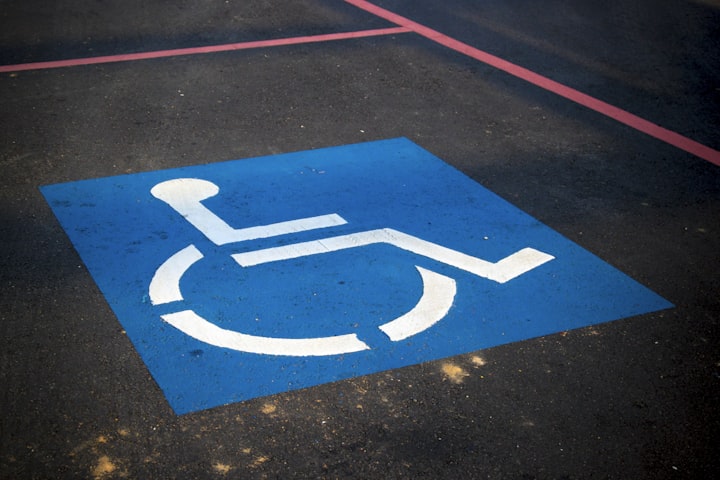Driving People With Disabilities in College Was Probably My Best Job
I learned a lot about myself and my own presumptions

I had a few jobs in college. During my freshman and sophomore year, I worked in the café/grill in the student union. The first half of my junior year I worked as a cater waitress at a local hotel, which paid amazing but could be super stressful dealing with drunk jerks at weddings, so after my friend left I quit too.
The opportunity to work driving vans for students and staff with disabilities presented itself because one of my housemates was a campus/off-campus bus driver (students drove all the buses on campus and had routes around town as well). She heard they were hiring, and also another roommate was dating the supervisor there and I knew him a little. So I had an ‘in.’
I felt nervous but also somewhat confident about the job interview. The interview itself was totally above board. When asked why I thought I could handle it and would be a good fit for the job, I did mention that a close friend of mine has muscular dystrophy and that I helped her in whatever capacity I was able when she needed assistance.
I was hesitant to play the “friend with a disability” card, but I felt like it was relevant, and showed I knew how to act around people who are differently abled. I thought I knew a lot more than I did though.
Just because you have a person with a disability who you love in your life does not prepare you for all of the things that working closely with people with different disabilities may throw at you, and I did find out that I actually had a lot to learn.
The biggest challenge to start with was re-learning how to drive. We drove vans, and we had to drive them on campus paths, as slowly as possible. All potholes and bumps in the road had to be avoided meticulously, no sudden stops were allowed if possible. I also got to learn to use a CB radio, which — not going to lie — was hugely fun!
And then there were the mechanics of loading and unloading passengers in wheelchairs onto the van. Some vans were older and required a little more elbow grease, while other vans were newer and had automatic locks that required perfect alignment which was sometimes more of a pain than using the old-fashioned straps. But it was pretty basic once you got the hang of it.
I first rode as an observer for a week with Bill*. Bill was a slightly older student and kind of a character. He reminded me a bit of Jeff Bridges in The Big Lebowski — he had an aloof but not unfriendly manner once you got to know him.
I observed how he interacted with the people we were driving. He was casual and adapted to each of their personalities as necessary. I am not the most outgoing person in the world so I was initially most nervous about this element of the job.
One thing that I was unprepared for was communication issues. Some passengers and I had a language barrier because of their disability.
There were a couple of students who, when I first met them, I could not really understand what they were saying. This would thankfully change over time, it was a case of me learning how to understand them, and them being no doubt ridiculously patient with me.
Some passengers were real chatterboxes, others treated the van as the glorified taxi service that it was. Although to be fair, they tended to be the temporary passengers — the sorority girl with a sprained ankle, the random people with injuries that would heal within a few weeks.
Depending on how busy we were, a temporary passenger might have to share a ride with a person with a permanent disability. This could be interesting.
Nine times out of ten, any discomfort an able-bodied person may have seemingly felt at the start would usually be overcome before long. On the rare occasion when someone was unfriendly, the passenger and I could always make a joke about it once they were gone.
If I had pickups on the same route with a disabled person and a temporary passenger before long they were often waiting for me together, and often the temporary passenger would try to step up in whatever way they could to help.
It seemed like some of them formed friendships that outlasted their time riding the van together. I would notice former passengers stopping to say hi to regulars as they waited.
It was both heartening and a little bittersweet to me. All it took for people to connect with a person they would normally not know how to talk to was familiarity, and I wish it was something that happened much more often than it does.
There could also be low moments. Sometimes if a passenger was having a bad day it would come out in the van. They might need the space to get upset without me pestering them about it, but more often than not they were ok to talk about what was bothering them.
If I felt someone was really struggling it might upset me if I didn’t feel I could help, but I could talk to my boss about it if need be, or sometimes the other drivers.
There were also a few times when I felt uncomfortable or not equipped to deal with some situations. There was Larry, a blind passenger, who I and some of the other female drivers felt uncomfortable at times with. He sometimes needed a hand getting to and from his drop-off, and he would hold your arm in a way that felt…excessive and a little weird.
Another passenger once asked me to help him change his shirt after I helped him into his home, and he said that another driver had been ok with it. It was not in my job description and it made me feel uncomfortable and guilty about it. Again, we could always raise stuff with our boss, but sometimes it was awkward.
I also had a regular passenger called Phil. Phil was tall, and had a big build. He relied on walking sticks but was very unstable on his feet and prone to taking tumbles. I could not physically lift him if he fell, and more than a few times I had to call for backup. It wasn’t his fault, but he likely should have had a care provider for certain things.
In the winter it was a particular problem because the vans weren’t allowed to drive in his parking lot, which was a sheet of ice usually, so it was always very stressful and I would get annoyed if I was assigned to pick him up without help, which may sound callous but if it went badly we could be liable.
Another of my favorite passengers was this cool artist kid from New York. He was very chill and friendly and often had a friend ride with him. But when he was on his own he had a slightly more sensitive personality and I could see that some of the façade he had with his friends was a front.
And then there was Mike. Mike had possibly the most severe disability of anyone we drove. He was quadriplegic with Cerebral Palsy and had severely impacted speech. He had a speech device he used sometimes but over time I came to be able to understand him quite well I felt, and we would be able to converse and joke a little.
One night I was working the dispatch instead of driving (we took bookings and communicated with drivers over CB radio at a dedicated dispatch desk) and I had a call from Mike. Mike was able to communicate via a computer when making calls.
It took me a minute to put two and two together that it was the same Mike I drove. Because the Mike on the phone seemed like a different person. I realized how the great communication I thought I shared with him was just a pale imitation of his true mental acuity.
I felt embarrassed to have believed I had begun to understand him.
It made me feel such a loss that our communication was so limited, and I could not begin to imagine what it would be like to spend a day in his shoes.
I have always remembered this job I had in college with much fondness. I think it taught me I can be a people person in the service field. But it also kind of spoiled me because this scenario was a very special and rewarding one for the most part.
Also on a superficial level, it was just a fun job to have, driving around to different places and meeting new people. It was rarely boring unless it was a quiet night shift, and even then you could get studying done.
This job also taught me that I could never even begin to understand what it is like to live in this world as a person with a disability. It saddens me how few people even try to care or learn about the challenges as well as the rewarding life experiences of those with disabilities.
I know I learned a heck of a lot, and I acknowledge it was from a relatively shallow experience compared to most people who live with or work closely with people with disabilities.
I never really considered working in the field, to be honest, I don’t know if I could hack it. The frustrations and discrimination that people with disabilities face in the world are something I care about deeply, but fear if I tried to work as an advocate it would drive me insane. But I do sometimes regret that I haven’t done more in this regard, knowing what I do with the experience I have had.
*All names changed for privacy
This article was originally published by the author on Medium
About the Creator
Steffany Ritchie
Hi, I mostly write memoir, essays and pop culture things. I am a long-time American expat in Scotland.






Comments
There are no comments for this story
Be the first to respond and start the conversation.